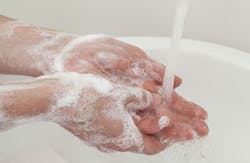Antibacterial soap exposes health workers to high levels of triclosan, according to a new study.
Researchers from the University of California, San Francisco (UCSF), said that hospital workers are exposed to significant and potentially unsafe levels of triclosan, a synthetic antibacterial agent, when they repeatedly wash their hands with antibacterial soap.
Triclosan is an ingredient of thousands of consumer products, including soaps and body washes, cosmetics, acne creams and toothpaste. However, research indicates that it can alter the regulation of hormones and may also contribute to making bacteria resistant to antibiotics.
As a result, the U.S. Food and Drug Administration (FDA) is reviewing the safety of triclosan.
The UCSF researchers analyzed urine samples from two groups of 38 doctors and nurses at two undisclosed hospitals. The first hospital used an antibacterial soap containing 0.3 percent triclosan, while the second used plain soap and water. Results showed that workers at the first hospital had significantly higher levels of triclosan in their urine than those at the second hospital.
Study participants were also asked if they used a particular brand of toothpaste that contains triclosan. Those who did use it had higher triclosan levels than those who did not, but the researchers found that washing with antibacterial soap accounted for higher triclosan levels than brushing with the toothpaste.
One of the investigators, Paul Blanc, MD, a professor of medicine at UCSF, said the study shows that people absorb triclosan at work and at home, depending on the products they use. He advised consumers to use an alternative if soaps that don't contain triclosan are available.
The study was published in the August issue of the Journal of Occupational and Environmental Medicine.
